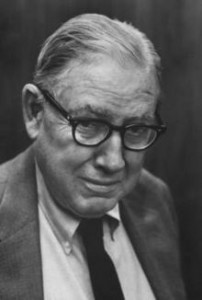
Frederic Ogden Nash ( 1902-1971) known as Ogden Nash to readers of his work is known for his children’s poems. His works have entertained children and adults alike since the creation of each work. In an era where such individuals as Will Eisner and Walt Disney were common names, Ogden Nash was the poetic voice to the child narrative.
Comparative Style
When looking at the works of Ogden Nash, one will see (if he or she is familiar with children’s poetry) that there is a strong similarity to the later work of Shel Silverstein. The poems tell a story in a way that is both memorable as well as entertaining. This is accomplished with the somewhat overly used rhyme scheme. Where his work is not as saturated with rhyme as Dr. Seuss, one will find that the lines do tend to play upon each other a great deal. Take for consideration the poem A Caution to Everybody.

What makes this poem so ridiculously marvelous is the intended (I hope) misuse of the verb think. It is almost as if the poet has placed an exclamation point upon the statement of man’s hastiness to complete or accomplish something before that which he desires it thought out in full. The verb, as one can plainly see, was changed to such to fit into the a,a,b,b rhyme of the poem.
It is not uncommon to see children’s authors misuse grammar to fit within the overall rhyme or narration of the poem. Where Ogden Nash is unique in comparison to most children’s authors is in the content which is presented. Poems such as Columbus present a story which is commonly known but then adds on a twist that is unknown. Still the rhyme is ever present, but the story which is given makes such less noticed.
One should take note that a great deal of the lines which are found within the poetry of Ogden Nash are older sayings which have been “tampered” with to create a new rendition such as in the following:

The child within the man
One may argue that those which have successful literary work within the genre of Children’s literature are somewhat of a child themselves. This can surely be stated of Ogden Nash. One has to have a level of childlike humor and cheer to be capable of concocting some of the wordage which appears in is poems.
For Older audiences
Ogden Nash did not limit his work to just the genre of children’s literature. Where most of his works are within that scope, many of his poems as well as phrases are not. Perhaps one of the best known quotes of Ogden Nash is “Candy is dandy, but liquor is quicker”. A rather amusing one liner, this is definitively not intended for memorization by a youngster.
The poems which are oriented to the older audiences strip away the childish rhymes (though there is still a slight bit of it) and address deep topics in a lighter manner. For example in I Do, I will, I Have any married man or woman will find the humor in the truth behind the words stated. However, for those that are not married and wondering what is great about such a union apart from somewhat guaranteed sex, than that person will find the answer of variance and incompatibility and learning to cope with each other’s differences to be present.
Out of the books which were published by Ogden Nash many are not intended for children. The misconception of the a,a,b,b rhyming to being that of children’s literature has most clearly been addressed and debunked in Ogden Nash’s poetry. Yes, the poet has quite a few poems which are intended for all ages, but then again he has several which only individuals of a certain age will fully grasp.
The joys of being
One of the attributes which contributes to the popularity of Ogden Nash’s work is the overall optimistic outlook upon life. Even in poems which have a serious message to be delivered, such as in Reflection of the Fallibility of Nemesis where the poet presents the argument in only four lines that great wealth cannot be obtained without losing a level of morals and scruples, one can see the jovial narrative which is so dominantly present in his work.
The perplexity which comes forth is in regards to how one should approach Ogden Nash’s works. Are these poems to be taken as mere nonsense and entertainment, lines which have been regurgitated upon paper for the amusement the reader? I would hope not. At the same time, I cannot put Ogden Nash’s poems within the same literary intellect as Lewis Carroll. Where it is true that both are children’s poets primarily, Carroll has a more classical poetic tone. It would appear that one would have to place the category within a different realm altogether.

